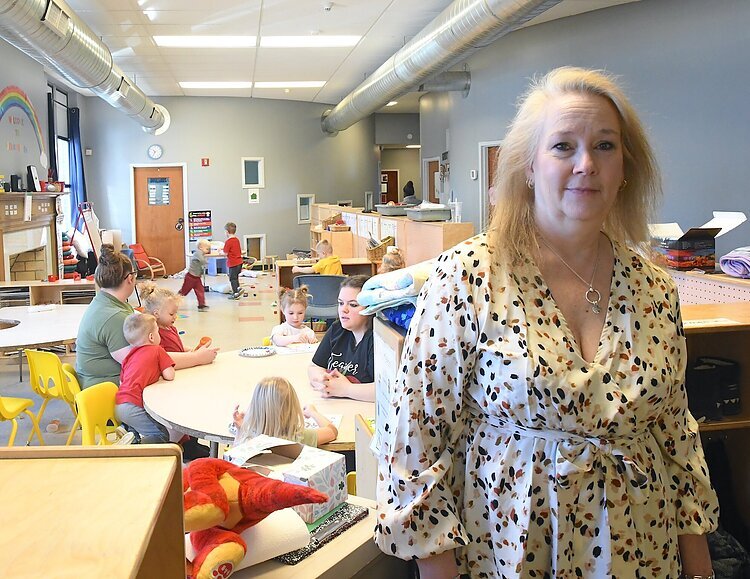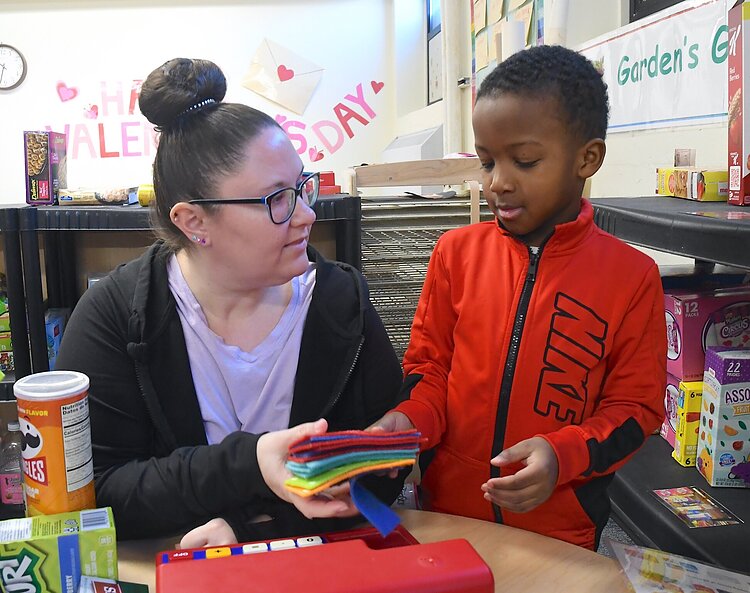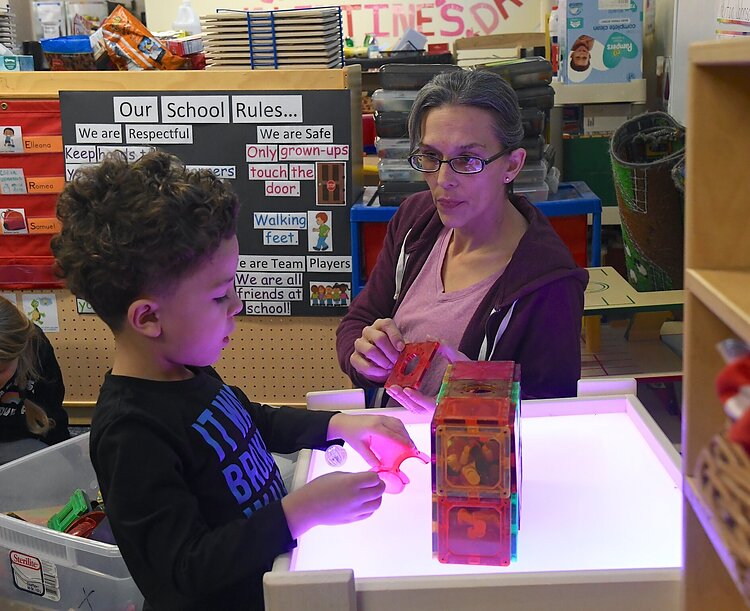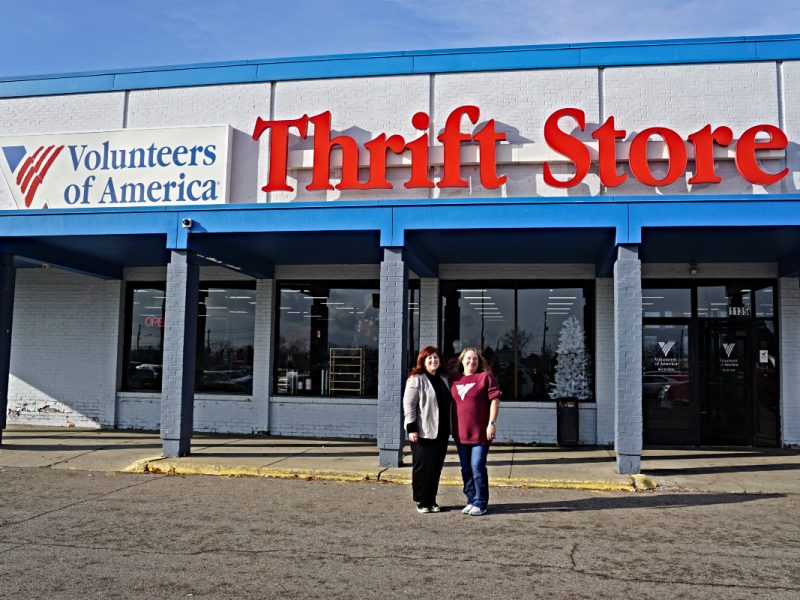Tri-Share makes quality child care more affordable for working parents
MI Tri-Share is a first-of-its-kind cost-sharing funding model. The state, the employee, and their employer each chip in for one-third of the price of child care.

Early Education Matters is a series about how Michigan parents, childcare providers, and early childhood educators are working together to implement PreK for All. It is made possible with funding from the W.K. Kellogg Foundation.
Recently, the front page headline of USA Today’s Money section turned curious minds towards Michigan: Working families struggle to afford child care. Could Michigan’s ‘Tri-Share’ model work?
Local proponents say yes. Initially Introduced by Gov. Gretchen Whitmer in March 2021 as a tri-regional pilot program, MI Tri-Share is a first-of-its-kind cost-sharing funding model. The state, the employee, and their employer each chip in for one-third of the price of child care. Child care costs are reduced by 66%. Essentially, the program helps keep people in the workforce and adds money to families’ bank accounts.
“Michigan is a leader across the nation with the Tri-Share approach,” says Kristina Bajtka, MI Tri-Share director at United Way of Northwest Michigan (NWMI). “Many states, such as North Carolina, New York, Ohio, Indiana, and West Virginia are following our success, and we talk to somebody new, probably every other week.”
She shares that one of the biggest barriers for people getting or keeping a job is whether or not they can afford to pay for child care while they are on the clock. Bajtka’s background includes extensive work in both the early childhood and business sectors. It’s why she’s “passionate about Michigan recognizing there is a problem, and not just talking about it, but actually putting some skin in the game.”
To her point, a recent report called Untapped MI: How Child Care Impacts Michigan’s Workforce Productivity and the State Economy, provides some telling numbers. Accessible and affordable childcare, the report states, is “key to unlocking Michigan’s economic potential and recouping nearly $3B in lost activity.”
Bajtka reports that, through December 2023, the program has saved $286,000 in child care costs for families in the 10 Northern Michigan counties that United Way of Northwest Michigan serves. As more people become aware of the trail-blazing model, she expects that interest to increase. So far, the program, which falls under the state’s new MI Leap department, has grown to cover the needs of 59 of 83 counties in Michigan.
“Think, if an employee’s child care costs $300 a week then that’s $200 a week back in their pocket,” Bajtka says. “Families can use that money for groceries, clothing, car payments, or any of the other necessities that they have in life.”
Initially, the hubs handled all administrative tasks, including recruiting employers and child care providers, determining employee eligibility, billing the state and the employers, and paying the child care providers directly.
Bajtka shares that last November, an RFP was put out for an administrative partner that could support Tri-Share’s growth. The United Way of Northwest Michigan was chosen. Bajtka says she’s looking forward to bringing more public awareness about the program’s benefits.
“Pay the house payment or pay the child care payment? Tri-Share is really unique in that it addresses what’s really a national economic issue,” Bajtka says. “The program has been growing pretty organically, we’re seeing success, and there’s still more to come.”

Removing barriers
Crucial to the initiative’s success has been the Michigan’s Women’s Commission (MWC), the original home and administrator of Tri-Share. Shannon Garrett, the organization’s CSO, says that she’s happy that what started out as a pilot in 2021 has become a permanent line item in the budget.
“Our mission is to help women have the careers that they want to have,” she says. “How do we remove barriers and obstacles to that? How to put more money in their pockets? Tri-Share is a way to help do both those things.”
During the pandemic, the MWC was working to understand how families were handling child care. Results from MWC’s 2021 Survey of Child Care Use During the Pandemic point to chips in womens’ economic security: 2.2% of respondents self-reported that they had to leave the workforce to take care of their children. Comparatively, approximately 1.7% indicated that their spouse had to leave the workforce for the same reason.
“Childcare was already a big problem, in terms of the availability and the affordability, before COVID-19,” Garrett says. “We really saw the numbers drop for women in the workforce. Women really took a step back to manage childcare full-time, to manage their children’s education virtually.”
“A godsend for parents”
April Goodwin, executive director of Southwest Childcare Resources Center, says that Tri-Share has been “a godsend for parents,” especially single mothers. Her organization is an increasingly busy Tri-Share facilitator hub — they receive 20-30 applications from parents every day. She and her Tri-Share program manager, Chelsea Smith, have been proving to employers that Tri-Share can be tailored to whatever they can afford.
“It’s for businesses in Michigan of all sizes, self-employed folks, employers of all sizes, who want to attract and retain talent,” Goodwin says. “When a business is interested, we work with them to help figure out their budget and employee eligibility.”
If a business comes to Smith with $30,000, for instance, some of her questions might include: How many employees do you think you have that could benefit? Do you want to split the $30,000 across two, or maybe three, families? Do you want to offer it as a lottery? Do you prefer to give it to the parents at the bottom of the income rung?

For parents, Goodwin emphasizes that family choice in child care is at the core of the new program. A parent’s current child care provider only needs to agree to send an invoice to the facilitator. The idea is to allow Michigan parents to go to work knowing that their children are safe, while honoring that they know best who should care for their kids.
“If they already have a child care provider, they can stay there. Or if they need help finding one, we will help them find it,” Goodwin says. “We want kids to be in safe and affordable places.”
Megan Russell Johnson, program officer for the W.K. Kellogg Foundation, says that her organization’s support of the initial evaluation of the pilot sites supports a learning and growth process. She shares that when a new initiative launches, there are always lessons along the way that can be applied to strengthen the effort over time.
“We are excited to support the Tri-Share program and the innovative approach they’re taking to the urgent childcare needs in Michigan, especially the engagement of the business community partnered with state funding to ease the burden of childcare costs for families,” she says.
Garrett reports a 10% growth month-over-month in regards to employers coming on board. She’s looking forward to diving into more conversations in the upcoming months.
“I think word is starting to spread that this is a permanent program,” Garrett says. “With that, we also have great anecdotal stories coming out of our hubs.”
The most striking one that comes to mind for Chelsea Smith, at the Southwest Childcare Resources Center, was a situation where a parent came to her scared that they would have to quit their “dream position.”
“Their daycare closed down. They couldn’t find daycare anywhere else because of how expensive it was. What was the choice?” she says. “We got them accepted into Tri-Share, they were able to get help with the daycare costs, and are now in their dream job.”
Jaishree Drepaul is a writer and editor based in Ann Arbor. She can be reached at jaishreeedit@gmail.com.
Photos by John Grap.





